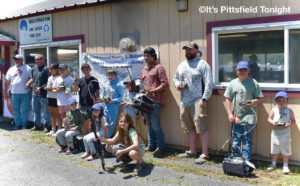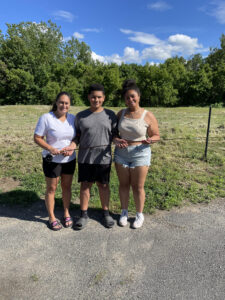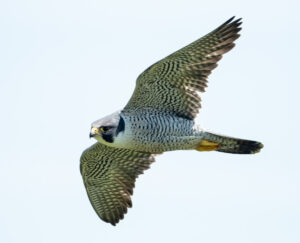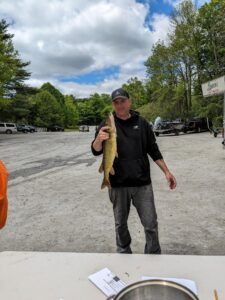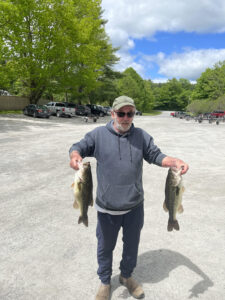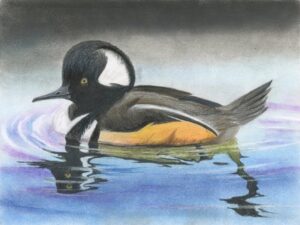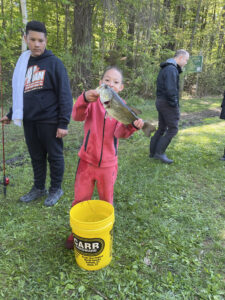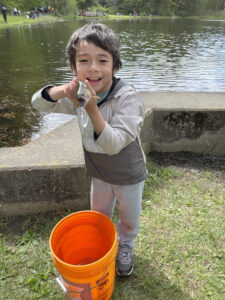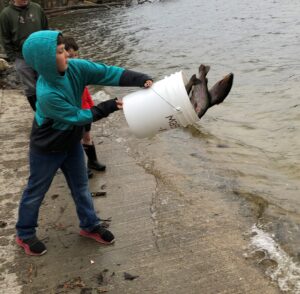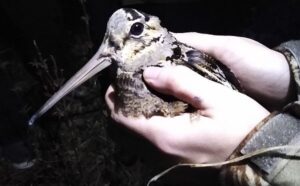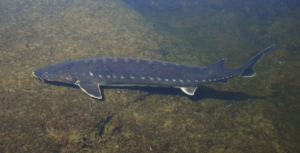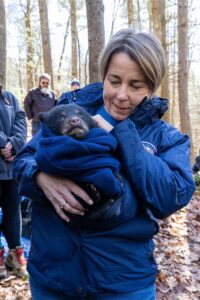According to event organizer Steve Bateman, the 32nd annual Harry A. Bateman Memorial Fund Fishing Derby was a huge success this year mainly in part because of all the great sponsors that supported the event and the great team that put this event on. The derby, which was held on June 1, had another record-breaking year with attendance and funds raised. Some 330 registered anglers plus another 30-40 people. They raised a record-breaking $13,500+ for the Jimmy Fund.
The largest fish weighed in was a 16 lbs. 4 oz Common Carp caught by Joe Trybus. This was also the largest fish ever weighed in the history of the fishing derby.
New to the derby’s sponsors this year was Joe Garzone of Berkshire Taxidermy who was kind enough to mount the winning trout in the children’s category. Certainly a gift to remember for a lifetime. They also had Chuck Maces of Maces Marine who donated the use of a pontoon boat for the entire day. Carlo Torra and John Erbin from COBB of Western MA brought children and parents throughout the day to experience fishing from a boat. For some it was their first time.
Free worms were provided by Onota Boat Livery. Mayor Peter Marchetti, Councilor Pete White and former Councilor Karen Kalinowski were in attendance. “There was so much support from our community that people from all over the county and other states attended this event,”said Bateman, “two people in attendance, Joe Monterosso and Sue Crawford, traveled in their electric wheelchairs, a 6 mile round trip for the 2nd year, to come to the fishing derby.”
Bateman feels that transportation for the handicapped community will be something that needs attention for next year’s Fishing Derby.
A great time was had by all.
This year they had several repeat winners at this event. The winners as reported by Steve are as follows:
CHILDREN HEAVIEST GAME FISH CATEGORY
1ST. PLACE: MASON KUCKA – NORTHERN PIKE 3 LBS. 13 OZ.
2ND. PLACE: QUINTYN SHUTTLEWORTH – LARGEMOUTH BASS- 2 LBS. 6 OZ.
3RD. PLACE: MILA OSTELLINO – RAINBOW TROUT – 1 LBS. 11 0Z.
CHILDREN HEAVIEST NON-GAME FISH CATEGORY
1ST. PLACE: CLOE SHUTTLEWORTH – BOW FIN – 6 LBS
2ND. PLACE: RAYCHELLE ERRICHETTO – BULLHEAD – 13 OZ.
3 RD. PLACE: CASSIDY WOJNICKI – BULLHEAD – 11 OZ.
ADULT HEAVIEST GAME FISH CATEGORY
1ST. PLACE: JORDAN PASQUARELLI- LARGEMOUTH BASS- 2 LBS. 10 OZ.
2ND. PLACE: DA’JAUN MERENDA– CHAIN PICKEREL – 1 LBS. 13 OZ.
3RD. PLACE: MIKE STORIE – LARGEMOUTH BASS- 1 LBS. 12 OZ.
SPECIAL HEAVIEST FISH 1ST. PLACE AWARDS
BASS: JIM BAK-LARGEMOUTH BASS – 3 LBS. 3 OZ. ADULT
PERCH/CRAPPIE: NICK SAYERS – CALICO BASS – 11 OZ.
CARP: JOE TRYBUS- COMMON CARP- 16 LBS. 4 OZ.
TROUT ADULT: JAKE BURKE – RAINBOW TROUT 2 LBS. 5 OZ.
CHILDREN TROUT: ALICE CHRISTMAN – RAINBOW TROUT 1 LBS. 12 OZ.
SPORTSMANSHIP AWARD: DELCAN ABLE
BUTCH PATRICK TACKLE BOX: JULIANNA MATTHEWS
RAFFLE: 55” TV – DAVID HUBBARD
$100 LOTTERY TREE- KIM SORRENTINO
50/5O RAFFLE PAID OUT $385
ADULT DOOR PRIZE: GAS GRILL IN MEMORY OF CARL DELUCE: ALBERT ADAMS
Cindy Delpapa honored
The Wild & Scenic Westfield River Committee recently awarded Cindy Delpapa, of Becket the Bob Thompson award for her dedication to the river and the breadth of knowledge she shared for the benefit of all. The news release mentioned “her high standards and clarity of focus guided the committee through an update of the strategic plan, development of a website focused on action, and a model for funding culvert replacement across the watershed that improves safety and river habitat at the same time.”
“Cindy was instrumental in launching two new initiatives, “Rooting out Barberry” and exploring “Brine for Pretreatment” to prevent ice from forming on our Hilltown roads in winter. Cindy brought Action Research in to assist the committee with developing campaigns that speak directly to the audience the committee is trying to reach in a manner that is clear, inspiring and motivating.
If you are interested in the committee’s work or participating in its initiatives visit https://westfieldriverwildscenic.org/.
Meredyth Babcock, volunteer and projects coordinator for the Wild & Scenic Westfield River Committee, gives us more information about Cindy. “After more than 25 years of service to the people of Massachusetts, the Department of Environmental Restoration’s (DER) Cindy Delpapa retired in late 2021. Cindy brought wide and deep expertise in water quality, stream ecology, estuarine ecology, regulatory policy, and grass-roots action to the Riverways Program and DER. She focused on urban river revitalization, streamflow restoration, and water quality restoration; however, she was truly interdisciplinary, always asking herself what the rivers need and adapting her work accordingly. In addition to her subject matter expertise, Cindy brought exceptional compassion to her work.”
“Always modest, Cindy would be surprised to know that she was perceived as a role model and mentor by many at DER. Countless rivers and wetlands benefited from her restoration expertise. We miss her wisdom and knowledge daily and wish her the best in her new adventures.”
Advice on consuming our local fish
The Massachusetts Department of Public Health samples the water and fish throughout Massachusetts for high levels of mercury and forever chemicals known as PFAS. The Mass. DPH then issues advisories for what fish should not be eaten based on where they are caught.
Mercury is a naturally occurring metal that is found in the environment but can also be released by coal-burning power plants. Fish with mercury can still be consumed in some cases but should be limited to less meals per month.
PFAS, Per- and poly-fluoroalkyl substances, are chemicals that have been used since the 1950s for stain-resistant, water-resistant and non-stick products. PFAS are commonly used in food packaging, clothing and other products. One source of contamination has also come from firefighting foam. Consuming these forever chemicals over an unknown amount of time has been associated with increased levels of cholesterol and live enzymes as well as an increase in the risk of high blood pressure and pre-eclampsia in pregnant women.
There is no way to remove these chemicals from fish already contaminated. They can not be cut, cleaned or cooked out, according to DPH.
The following bodies of water in Berkshire County have been issued advisories as of May 2024. If you are more sensitive to these types of hazards, it is recommended to avoid eating any of these fish:
Ashley Lake in Washington – Mercury Hazard – Limit Yellow Perch to 2 meals/month
Ashmere Lake in Hinsdale – Mercury Hazard – Limit Chain Pickerel, Largemouth Bass to 2 meals/month
Big Pond in Otis – Mercury Hazard – Do not eat Largemouth Bass, limit other fish to 2 meals/month
Buckley Dunton Lake in Becket – Mercury Hazard – Do not eat Largemouth Bass
Garfield Lake in Monterey – Mercury Hazard – Limit Largemouth Bass to 2 meals/month
Goodrich Pond in Pittsfield – PCBs Hazard – Do not eat any fish
Hoosic River in North Adams, Williamstown – PCBs, PFAS Hazard – Do not eat any fish
Housatonic River – PCBs Hazard – Do not eat any fish including frogs and turtles
Konkapot River in Sheffield, New Marlborough – Mercury Hazard – Limit all fish to 2 meals/months
Morewood Lake in Pittsfield – PCBs Hazard – Do not eat any fish
Otis Reservoir in Otis, Tolland – Mercury Hazard – Limit all fish to 2 meals/month
Plunkett Reservoir in Hinsdale – Mercury Hazard – Limit Largemouth Bass to 2 meals/month
Pontoosuc Lake in Pittsfield, Lanesborough – Mercury, PFAS – Limit Largemouth Bass to 2 meals/month, limit other fish to 2 meals/month
Silver Lake in Pittsfield – PCBs Hazard – Do not eat any fish
Upper Spectacle Pond in Otis, Sandisfield – PFAS Hazard – Limit all fish to 1 meal/week
Windsor Lake in Windsor – Mercury Hazard – Do not eat Largemouth Bass
The good news is that MassWildlife stocks local lakes and rivers with healthy trout twice a year which can be consumed.
Pittsfield Open Space & Recreation Survey
Pittsfield is updating its Open Space & Recreation Plan (OSRP) and needs your help. Your input will help guide the planning process and determine the future of recreation and open space in the city. The plan will make Pittsfield eligible for state reimbursement grant programs for the improvement of recreation areas and the protection of open spaces.
The survey, which will be open from June 6 to July 7, has questions that may be of interest to Pittsfield hunters and fishermen, so you might want to make your voice heard. The questionnaire is open to all residents, and responses will be confidential. Click onto https://www.surveymonkey.com/r/PittsfieldOSRP.

